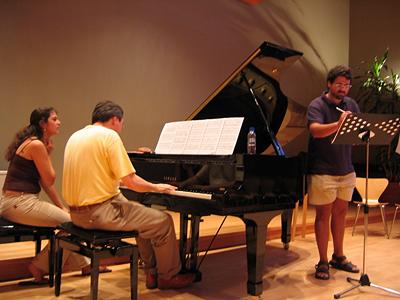|
<< -- 4 -- Tess Crebbin DIVING INTO THE MUSIC

TC: In your case, talent and luck seem to have come together at just the right time.
WR: Yes, luck played a big part in it. It is difficult to make it to the top and I do not wish to evoke the impression that it is a piece of cake. When I started out, I had my doubts just like everyone else. My friends never did, they said, as did Deutsch, that they have no worries over my future career. But when you are in the midst of it, living this career-ascent path, it's a different ballgame. You ask yourself what you will do if it doesn't pan out. I still recall how proud I was when I had some money left over from the first concerts. I ended up putting some aside. Eventually I had saved up enough to enable me to survive for one full year without any booking coming in. That was the most wonderful feeling you can imagine. Then I bought my first high-quality instrument. I had my own piano all through my studies, but a grand is something different, as any pianist will know. I think we all dream of our own Steinway grand. Around 1990, when I had my first concerts with Mrs Fassbänder, I made that dream come true for myself and bought a brand new Steinway grand piano.
TC: And now you are one of the most successful accompanists in the world. Teaching young people is an important part of your own life now. You have just returned from Barcelona, Spain, where you did a course in Lied for young students there.
WR: I do this every year. It is such a delight to work with these young people. They are so talented, attentive, and eager to learn. Spain is one of my favorite countries and I go there a lot. In Spain, as in Berlin at the music academy, I teach the team. The singer learns how to work with the accompanist and vice versa. I do not teach singing per se, although I may make the odd remark to the singer but not in the context that a voice teacher would. I might tell him that he needs to get himself a bit of advice from his voice teacher on this or that point. The pianist is someone I will talk to in technical terms also, however.

Rieger demonstrates the secrets of accompanying.
|
TC: You do your course in Spanish?
WR: Naturally. As one teaches people of different nationalities, one learns to speak the language. It was a one week course filled with different classes, discussions and performances.
TC: You are also a professor for Lied at the Hans Eisler Music Academy in Berlin. This is known as one of the best music schools in the world, which tends to succeed in getting the top musicians in their field as teachers. Thomas Quasthoff is there, Julia Varady ... so, admission requirements must be quite tough.
WR: They have to be. Music is a very competitive business. There are so many hopeful young musicians. Few actually succeed in making a living at it at all and fewer still make it to the top. It is a matter of having to be cruel to be kind. When I see that someone doesn't have what it takes, I either don't admit them in the first place or, if it only becomes clear during the course, I take them aside and tell them that it is better to call it quits. It is a postgraduate course I teach, but the students are still young people. What sense would it make to teach someone, take years out of their life, only for them to end up unemployed and maybe too old then to start over with a new profession? So when there are really fundamental problems, I prefer to keep matters short and as painless as possible.
TC: Let's say someone comes to you and wants to enter your class. He or she is a great pianist, could easily hold his own on stage as a concert pianist. But now he comes with a singer in tow, they do a Lied together, and you realise that he has no sensitivity whatsoever for the singer. They are not in tune. The prospective student is not a team player. Is this something you can teach?
WR: That would be one of the typical problems that instantly disqualify from admission. If the team player mentality is not there, I tell the person to go home.
Continue >>
Copyright © 29 July 2004
Tess Crebbin, Germany

| 
